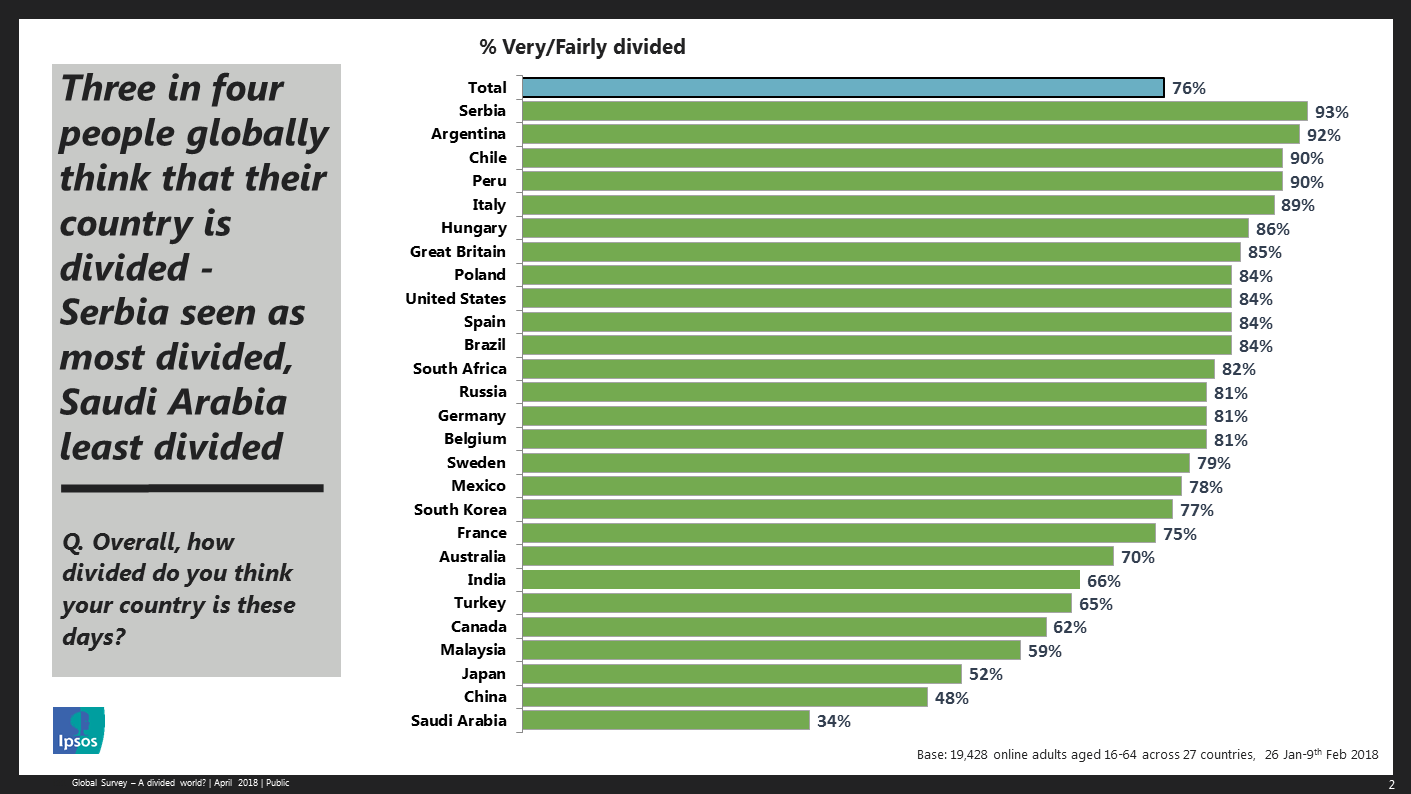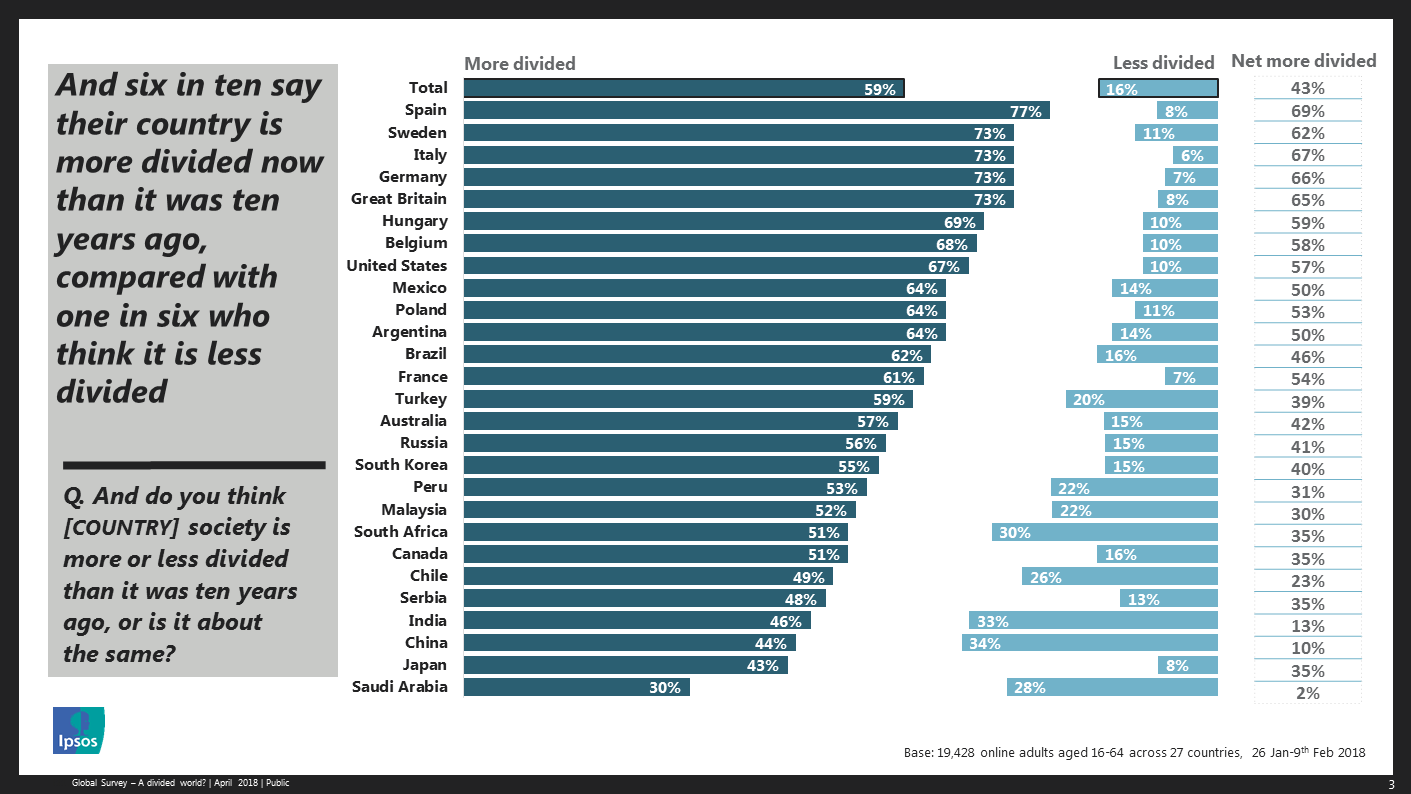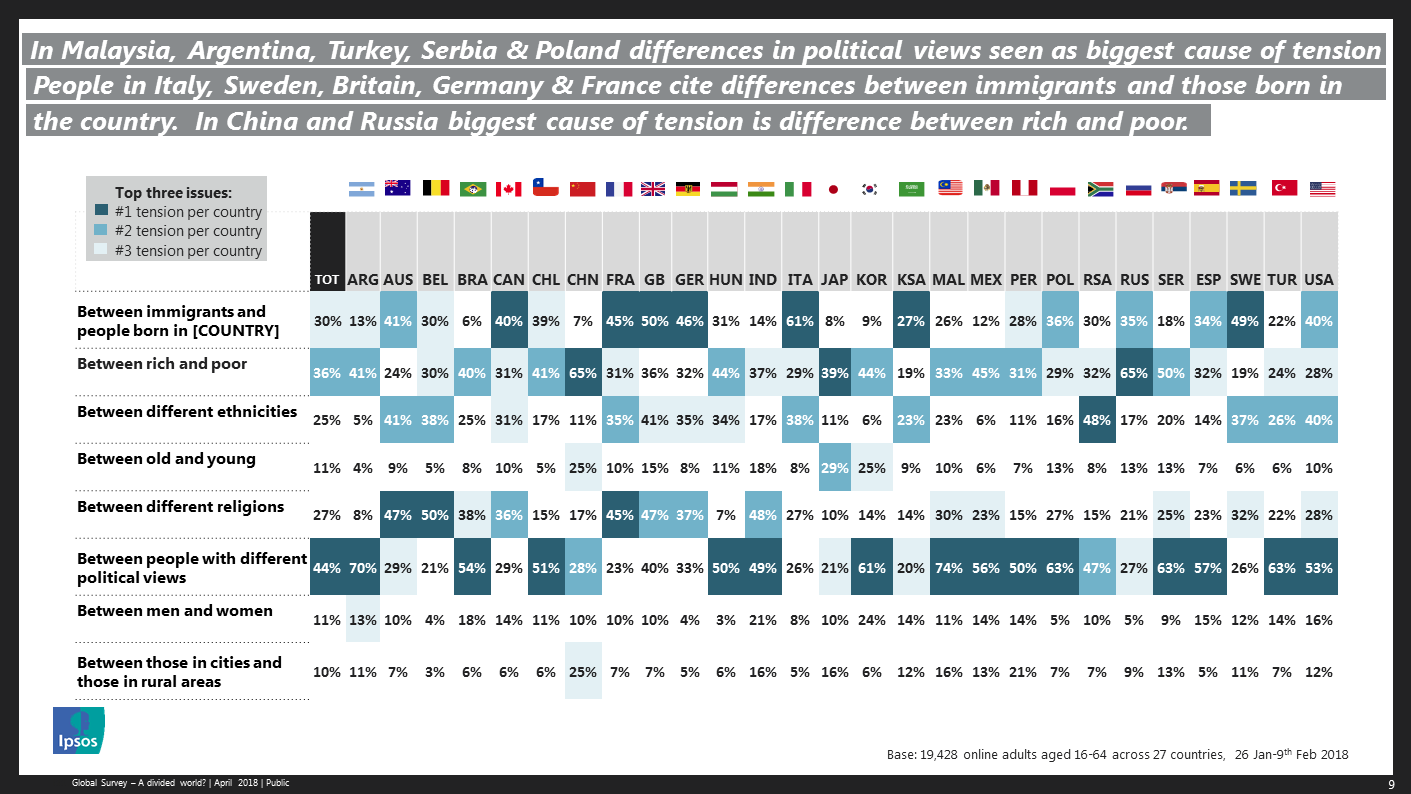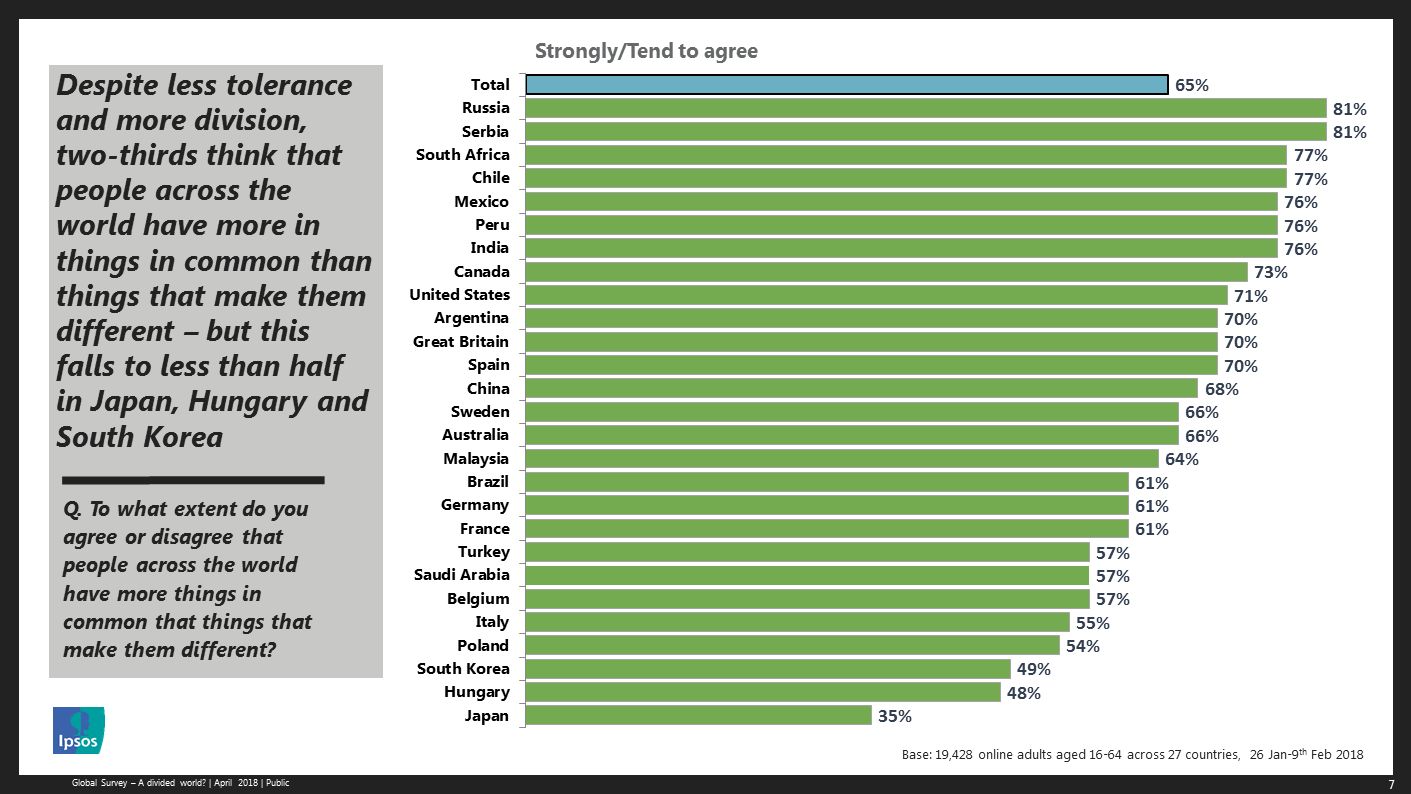BBC Global Survey: A world divided?
- Three-quarters around the world say their country’s society is divided – and the majority think their country is now more divided than it was 10 years ago, especially in Europe
- Differences in political views are seen as the greatest cause of tension, followed by differences between rich and poor
- However, despite these divisions, the majority of people in most countries agree that people across the world have more things in common than things that make them different
A new global Ipsos study, carried out in 27 countries for the BBC, highlights the extent to which people think their society is divided. The poll, carried out online among adults aged under 65 in January and February this year, investigates public attitudes towards division and societal tensions around the world. The study finds that three in four people on average across the 27 countries (76%) think society in their country is divided. Countries that are most concerned about division are Serbia, where most people (93%) say their society is divided, Argentina (92%), Peru and Chile (both 90%). Those in Saudi Arabia are least likely to say their country is divided (34%) followed by China (48%) and Japan (52%).

When asked how divisions have changed since ten years ago, six in ten (59%) feel their country is now more divided (compared with 16% who say it is less divided). European countries are the most likely to think divisions have grown; three-quarters (77%) of people in Spain say their country is more divided now than a decade ago followed by Sweden, Germany, Britain and Italy (all 73%).

Across the 27 countries, the greatest cause of tensions are felt to be between people with different political views (44%), differences between rich and poor (36%), differences between immigrants and people born in the country (30%) and differences between religions (27%).

- Countries that are most likely to say there is tension between people with different political views are Malaysia (74%), Argentina (70%) and Poland, Turkey and Serbia (all 63%).
- Two-thirds of people (65%) in Russia and China say that differences between rich and poor cause most tension.
- Tensions between immigrants and people born in the country are seen as particular issues in many European countries – Italy (61%), Great Britain (50%), Sweden (49%), Germany (46%), France (45%).
- Half or close to half of people in Belgium (50%), Great Britain (47%), Australia (47%) and France (45%) think there is most tension between people of different religions in their country.
There is, however, some optimism in the study; the majority of people (65%) think that people across the world have more things in common than things that make them different. Agreement is highest in Russia and Serbia (both 81%) but lowest in Japan (35%) and Hungary (48%) and South Korea (49%).

Other findings from the survey show:
- Views are split are whether people are tolerant of people with different backgrounds, cultures or points of view; globally, 46% say their country is very/fairly tolerant while 50% say it is not very / not at all tolerant). Canada comes out on top with 74% saying they are very or fairly tolerant, followed by China (65%) and Malaysia (64%). People in Hungary and South Korea report the lowest levels of tolerance (16% and 20% respectively).
- When asked if people in their country have become more or less tolerant over the last decade, on balance, more people say that people have become less tolerant (39%) than more tolerant (30%). People in China (59%), Chile (44%), Canada (42%) and Peru (42%) are most likely to say people have become more tolerant whereas people in Hungary (62%), Belgium (57%) and Italy (57%) are most likely to say their country has become less tolerant.
- While one in five (20%) people globally say they trust all groups equally, groups that are least trusted include those with different political views (18%), immigrants (16%), and people who are wealthier (13%). People with different political views are least trusted in South Korea (35%), Turkey and Malaysia (both 28%) whereas people are least trusting of immigrants in Russia (34%), Malaysia (31%) and Hungary (28%).
- Mixing with people from other backgrounds is seen with more suspicion in European countries. Globally, only 14% say mixing with people from other backgrounds, cultures or points of view causes conflict but this is higher in Hungary (34%), Sweden (33%), Germany (29%) and Belgium (27%).
- A third (34%) say mixing can sometimes lead to misunderstandings but these can usually be overcome while 40% say mixing leads to mutual understanding and respect. Malaysia is the country where most say mixing leads to understanding and respect (68%) followed by Chile (64%) and Mexico (63%). In Britain half (52%) say this.
- Figures are similar when asking about mixing with people from different religions. Sixteen percent say mixing with people from different religions causes conflict – with higher figures in Belgium (31%) Sweden (30%) and Germany (29%).
- A third (34%) say mixing with people from other religions can lead to misunderstandings but these can usually be overcome and 37% say it leads to mutual understanding and respect. Again Malaysia comes out on top, with 71% saying mixing with people from different religions leads to understanding and respect followed by Turkey (66%) and Argentina (53%).
Commenting on the findings, Bobby Duffy, Managing Director, Ipsos Social Research Institute said:
This study shows that people across the globe think their societies have become increasingly divided compared with ten years ago and that the greatest cause of tension is between people with different political views. But the study shows there some very different divisions around the world. Differences between immigrants and people born in the country are seen as a particular cause of tension among many Western European countries whereas tension between rich and poor is the top concern in Russia, China and Japan.
But there is still good news in the survey. Only a small number think mixing with people from different backgrounds or points of view causes tension, while most think mixing leads to mutual understanding and respect or if there is tension this can usually be overcome. What’s more, the majority of people -two-thirds globally - agree that people across the world have more things in common than things that make them different.
Technical Note
- In total 19,428 were interviewed between 26 January – 9 February, 2018. The survey was conducted in 27 countries around the world via the Ipsos Online Panel system (Argentina, Australia, Belgium, Brazil, Canada, Chile, China, France, Great Britain, Germany, Hungary, India, Italy, Japan, Malaysia, Mexico, Peru, Poland, Russia, Saudi Arabia, Serbia, South Africa, South Korea, Spain, Sweden, Turkey and the USA).
- Approximately 1000 individuals aged 16-64 or 18-64 were surveyed in Australia, Brazil, Canada, China, France, Italy, Japan, Russia, Spain, Great Britain, and the USA. Approximately 500 individuals aged 16-64 were surveyed in Argentina, Belgium, Chile, Hungary, India, Malaysia, Mexico, Peru, Poland, Saudi Arabia, Serbia, South Africa, South Korea, Sweden, Turkey.
- The precision of Ipsos online polls are calculated using a credibility interval with a poll of 1,000 accurate to +/- 3.5 percentage points and of 500 accurate to +/- 5.0 percentage points. For more information on the Ipsos use of credibility intervals, please visit the Ipsos website.
- Data are weighted to match the profile of the population. 16 of the 27 countries surveyed generate nationally representative samples in their countries (Argentina, Australia, Belgium, Canada, France, Germany, Great Britain, Hungary, Italy, Japan, Poland, Serbia, South Korea, Spain, Sweden, and United States). Brazil, Chile, China, India, Malaysia, Mexico, Peru, Russia, Saudi Arabia, South Africa and Turkey produce a national sample that is considered to represent a more affluent, connected population. These are still a vital social group to understand in these countries, representing an important and emerging middle class.




